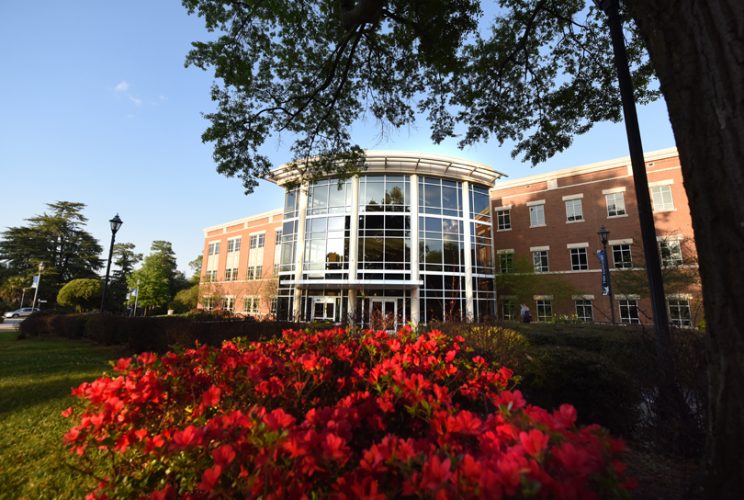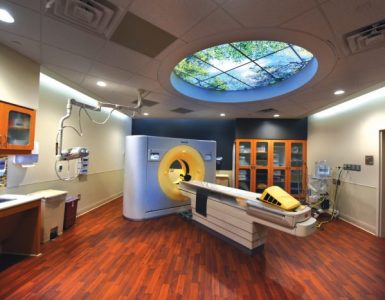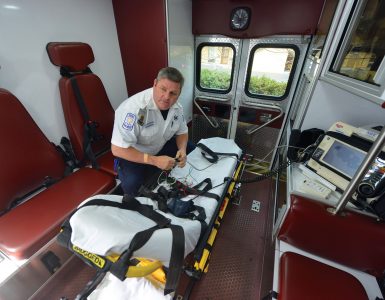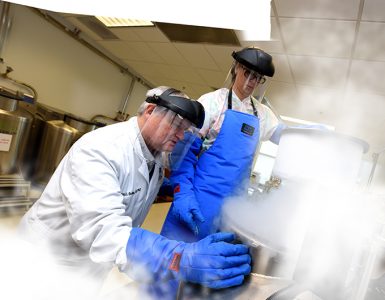The College of Education offers a wide variety of career paths for its students, ranging from mental health counseling to exercise and sports science to music education. At its core, however, the college is committed to teaching its students to make a difference in the world, and nowhere is that commitment more evident than in the research being conducted by its faculty.
Far from the dry, theoretical research many outside the education field associate with the profession, much of the research coming out of the College of Education crackles with everyday relevance and real-world application.
The following faculty members represent just a few of those making a very real difference with their research.
Stories by Brennan Meagher
Photos by Phil Jones
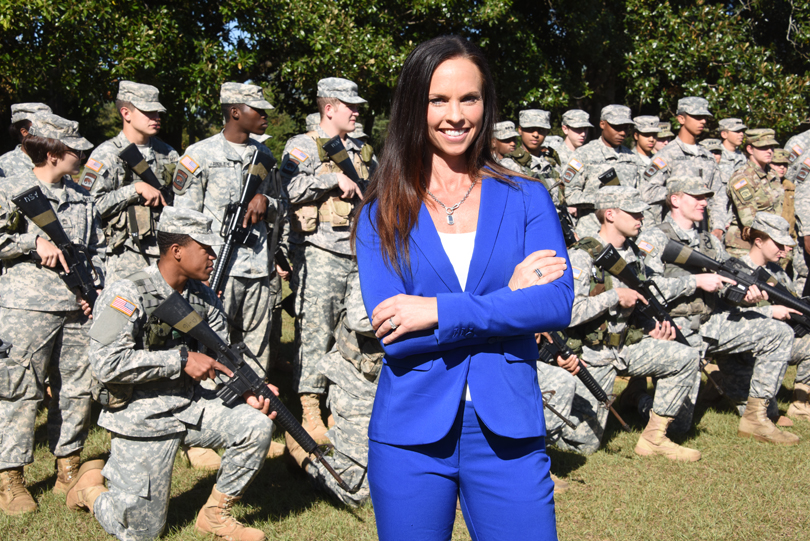
Dr. Meredith Rausch:
Resilience and the military
Much of Dr. Meredith Rausch’s research focuses on the military, and it is intensely personal.
“I come from a military family,” said Rausch, assistant professor in the Department of Advanced Studies and Innovation. “My dad, uncle and grandfather were all military, but I was unable to join the military because I was born with a heart issue. So, I feel like I can serve my country by serving those who have served us.”
Rausch recently completed a research project in partnership with Dr. Megan Buning, assistant professor of research. Together, they surveyed students on the Augusta University campus who are using military benefits in an effort to learn what Augusta professors are doing that is helpful for this group of students as well as what is making it harder for these students to transition to the civilian classroom.
“We discovered transitioning students tend to have more responsibility than traditional undergraduate students,” she said. “Therefore, group projects tend to be a problem.”
In addition, their maturity levels are also different, so they tend to struggle in classrooms where teachers don’t keep strict control of the classroom environment.
“It makes them feel unsafe because they’re not used to that culture,” Rausch said.
According to Rausch, it’s also important for professors to realize that not every military student has PTSD or a traumatic brain injury, but they do have a rich history and can bring a lot to the classroom.
Other research projects Rausch is working on include mentorship of women, lesbian and queer women going through the fertility process, and improv comedy.
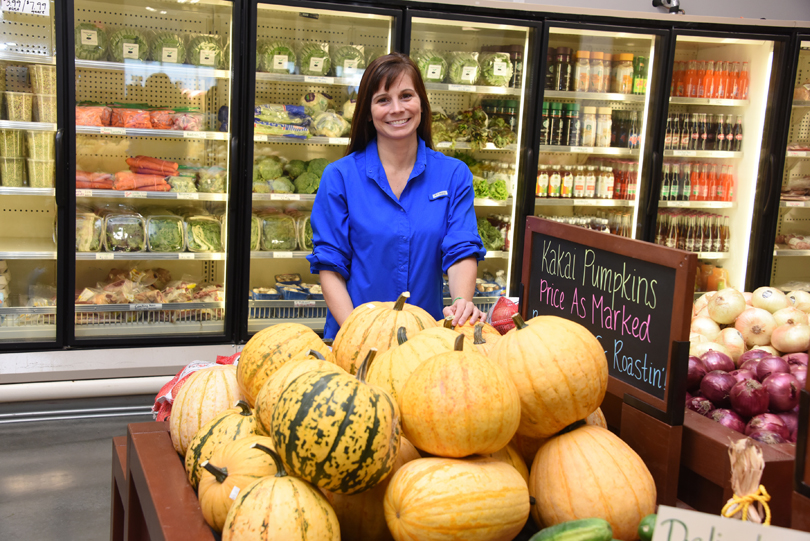
at Good Earth Produce & Garden Center.
Dr. Maleah Holland:
Ketogenic diet
While in college, Dr. Maleah Holland, assistant professor in the Department of Kinesiology, was both a field hockey and track and field athlete. Her participation in sports led to a few injuries, particularly head injuries.
Holland eventually transitioned from an athlete to a researcher, electing to study the ketogenic diet in rats for her dissertation because of her personal association with the diet.
“I ended up deciding to try the ketogenic diet,” she said. “It helped my brain energy levels. I felt completely different, and thought ‘I want to study this.’”
The ketogenic diet, often called a low-carb diet, and ketones, produced when the body converts fat to energy, are now the focus of much of Holland’s research.
Ketones have proven beneficial for conditions such as brain cancer, Parkinson’s, Alzheimer’s and epilepsy, according to Holland. Holland’s research explores the benefits of ketones in cognitive development and exercise fatigue.
“Most people take in sugar for energy,” she said. “This is a different source, but provides the same type of energy for the brain. It’s supposed to be a clean-burning energy for the brain.”
Holland’s next project will focus on the ketogenic diet and patients with post-traumatic stress disorder (PTSD).
She plans to compare patients with PTSD who take ketone supplements for six weeks with patients who eat ketogenic meals for six weeks.
“The ideal outcome is that there will be great benefits from ketone supplements,” she said. “I believe the benefits will mainly be cognitive. We may also see patients experience weight loss or less oxidative stress.”
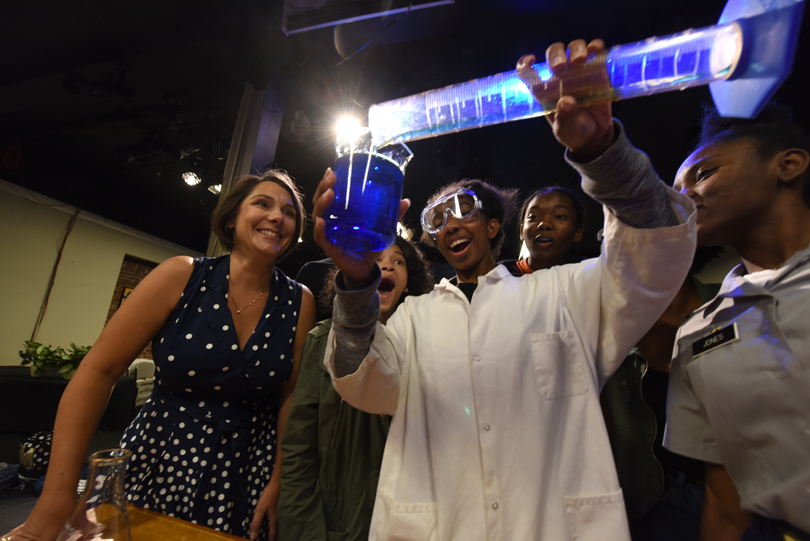
Dr. Ashley Gess:
Integrative STEAM/STEM education
According to Dr. Ashley Gess, integrative STEAM/STEM education is an educational approach where teachers intentionally design opportunities for their students to engage in the design process and transfer knowledge from one context to another.
In her approach to this type of learning, Gess intentionally removes the period from the acronyms.
“We take the dots out so it becomes more than just talking
about subjects,” she said. “It becomes an educational approach in the classroom.”
When Gess first arrived at Augusta University, she conducted a needs assessment in public schools within the Central Savannah River Area.
“There were no Georgia STEM-certified schools when I arrived, and I wanted to understand why,” she said.
Now, in one initiative she has named STEAMteams, approximately 120 teachers from six counties work with Gess and her colleagues once a month. The teachers are tracked throughout the year with regard to self-efficacy, inquiry teaching and their interest in teaching using a STEM approach. An additional 44 teachers are working to obtain nine graduate credit hours toward the newly approved STEM endorsement.
Gess has also partnered with the Jessye Norman School for the Arts to bring science theater into schools and communities.
“Part of what plagues our schools, especially rural schools or those with higher incidence of families in poverty, is that they can’t get to places like museums,” she said. “We’re trying to develop science theater and bring it to them. The goal is to promote student interest and, by extension, improve students’ persistence in STEM disciplines.”
Gess is hoping to specifically target women and minorities with the partnership.
“A lot of STEM research has shown that women achieve at the same rate as men, and sometimes exceed men, but don’t persist in STEM subjects,” she said.
At the heart of Gess’ love for STEAM/STEM education is the desire for students and teachers alike to receive the opportunity to chase their dreams.
“So many people, including women, under-represented minorities and folks with disabilities get locked out of going after their dreams,” she said. “However, with a STEAM classroom, everyone wins.”

